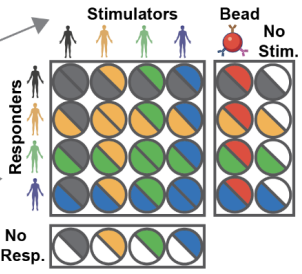Abstract
Single-cell chromatin accessibility has emerged as a powerful means of understanding the epigenetic landscape of diverse tissues and cell types, but profiling cells from many independent specimens is challenging and costly. Here we describe a novel approach, sciPlex-ATAC-seq, which uses unmodified DNA oligos as sample-specific nuclear labels, enabling the concurrent profiling of chromatin accessibility within single nuclei from virtually unlimited specimens or experimental conditions. We first demonstrate our method with a chemical epigenomics screen, in which we identify drug-altered distal regulatory sites predictive of compound- and dose-dependent effects on transcription. We then analyze cell type-specific chromatin changes in PBMCs from multiple donors responding to synthetic and allogeneic immune stimulation. We quantify stimulation-altered immune cell compositions and isolate the unique effects of allogeneic stimulation on chromatin accessibility specific to T-lymphocytes. Finally, we observe that impaired global chromatin decondensation often coincides with chemical inhibition of allogeneic T-cell activation.
